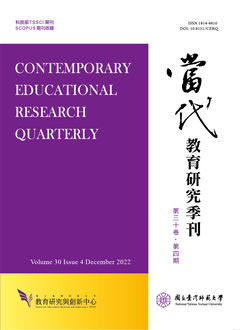

研究目的
新頒《中華民國教師專業素養指引—師資職前教育階段暨師資職前教育課程基準》(簡稱《課程基準》)於108學年度正式施行後,師培課程除了教育基礎學與方法學外,增加了「教育實踐課程」比重,期許職前階段能與教學現場有更豐富的連結。為實現《課程基準》中師資生應培養「團隊合作」與「持續專業成長」之素養,本研究藉由北部某師培大學開設的教育實踐課程帶領師資生至鄰近社區高中進行8週英文課後補救教學為例,運用精熟學習法架構,採「三人一組」的入班合作教學模式,探討此課程設計能否為準教師奠定教師專業素養之基礎。
研究設計/方法/取徑
師資生團隊入班之設計,在人力充足的情況下,能在課堂中將中學生分流進行更細緻的差異化教學,運用師培課程中習得之理論於真實情境。三位師資生同時搭配師培教授與現職教師進行共備、觀課與議課,除了激發教學創意,也模擬現今教學現場的公開課活動、教師社群討論等,將中小學教師共學的氛圍向前延伸至職前教育階段。本研究訪談了18位修習本課程之英文科師資生與1位指導教師,並搭配師資生期末「教學歷程檔案」中的課堂記錄與反思,進行訪談與文件分析。
研究發現或結論
此實踐課程設計可作為師資生們於未來成為教師獨立授課與班級管理之中介課程。團隊入班減緩師資生的教學焦慮,在集體腦力激盪的團隊合作下,能相互觀摩與成長;師資生透過形成性評量將學生進行差異化分組,輔導高、中、低不同程度之同學,增益自身基礎概念與加深加廣內容之教學技巧。同時,連續8週的短期帶班經驗彌補了師培課程中欠缺的班級經營實務,能作為橋接理論與實務之課程,逐步培養獨當一面之能力。此外,師資生與指導教師在過程中彼此給予支持與回饋,展現教師社群共備、觀課、議課之氛圍。
研究原創性/價值
《課程基準》強調「團隊合作」素養之重要性,然而師培課程中較少將此項素養實際運用於現場教學之設計。「三人一組」於實務現場的合作教學是本實踐課程之特色,師資生能在同儕支持下嘗試不同的教學策略,並體會共備社群之助益;師培教授與中學指導老師的加入,也確保入班授課品質,而非將合作學校作為實踐的白老鼠,肩負大學之社會責任;此研究最後提出三項針對教育實踐課程設計之建議:師培機構應連結實務現場作為師資生「探究與實作」的場域、鼓勵師培課程加強「合作教學」的素養培育、「教師社群」氛圍應融入於日常的師培課程之中。
Purpose
After the introduction of a new teacher education curriculum structure in 2019, the proportion of practice courses, vis-à-vis the traditional foundation and methodology courses, has been significantly increased. Closely linked to schools, practice courses are expected to give pre-service teachers preliminary teaching experience. This research examines a newly designed practice course, which aims to enhance course-takers’ techniques of co-teaching and to encourage the formation of professional learning communities, and this example may provide valuable ideas and inspiration for other teacher education institutes to learn from.
Design/methodology/approach
This practice course, implemented in a teacher education center in Taipei, established a partnership with a senior high school for an eight- week teaching practicum. Three English pre-service teachers were grouped as a team to help students experiencing difficulty keeping up with peers. A teacher educator and an experienced high school teacher were also involved in lesson preparation, classroom observation, post-course discussion and the setting up of a professional learning community. This research interviewed 18 pre-service teachers who participated in this course as well as their guiding mentors. In addition, their teaching portfolios were also analyzed to examine any actual enhancement in classroom practice.
Findings/results
The gathered data demonstrated that ‘co-teaching’ reduced anxiety among pre-service teachers and collective effort not only improved lesson planning, but also fostered an atmosphere of professional development. Pre-service teachers employed formative assessments to divide students into groups of high, medium and low ability levels. In class, they can practice teaching basic core knowledge as well as more advanced content, which exhibited the feature of a differentiated class. Moreover, this course offered a rare opportunity for pre-service teachers to experience leading a class of students for eight consecutive weeks. The intensity of this teaching practice can be seen as a bridging course closing the gap between pre-service training and a full teaching load in an actual school setting.
Originality/value
The guidelines of the new teacher education curriculum put emphasis on pre-service teachers gaining competence in teamwork, a goal rarely stressed in such courses. This design provides a real context for course-takers to explore co-teaching and experiment with the pedagogies and strategies they can deliver together in class. As part of this process, professional learning communities work as a platform and catalyst for young teachers to explore fresh ideas and accustom themselves to this cooperative culture for future lifelong teaching professional development.

本著作係採用創用 CC 姓名標示-非商業性 3.0 台灣 授權條款授權.
本刊國立台灣師範大學教育研究與創新中心
106台北市和平東路一段162號 | 電話: 02-7749-3670 | E-mail: cerecerq@gmail.com
教創中心 | 師大 | 電子報 | 線上投審系統
本刊由國家科學及技術委員會人文社會科學研究中心補助經費
© 2014 CERI-NTNU
